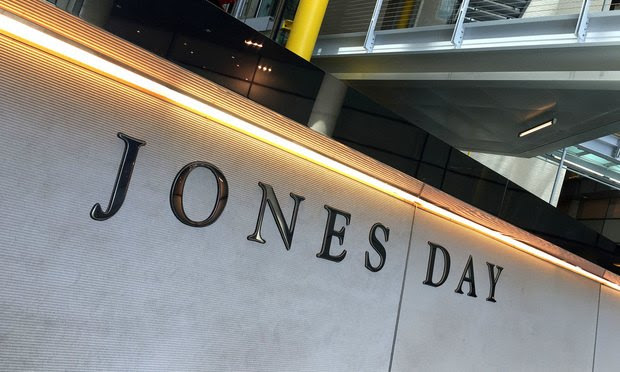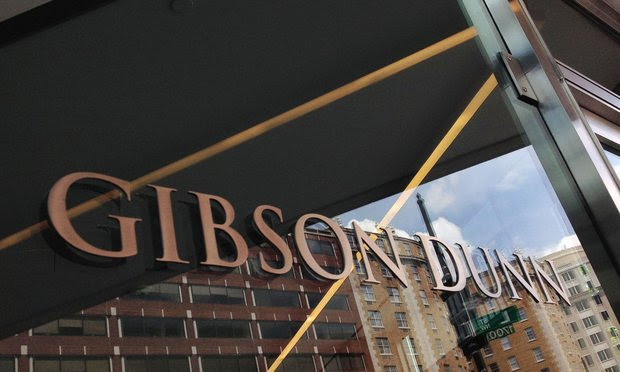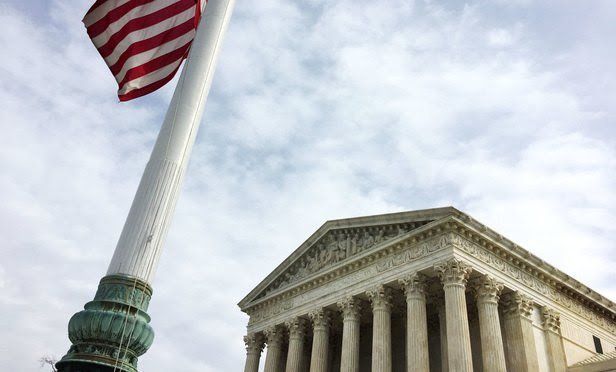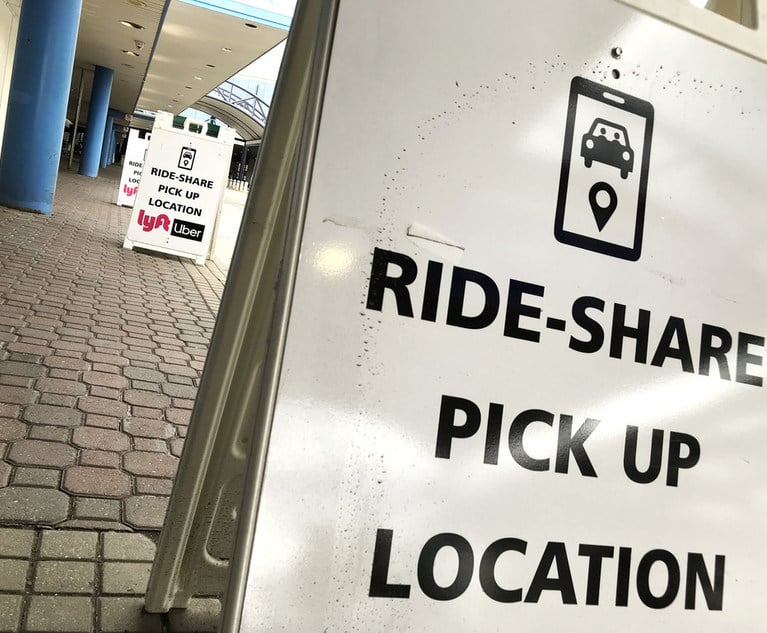Labor of Law: Updates on Jones Day Litigation | Covid-19 and 'Bring-Your-Own-Device' | Big New ERISA Suit | Workplace Headlines | Who Got the Work
Welcome to Labor of Law, our snapshot on all the things L&E. We've got updates below on the big Jones Day associate lawsuit, and a report on bring-your-own device in the virus era. Scroll down for Who Got the Work, and new and notable headlines about the workplace in the covid-19 era. Thanks for reading!
July 16, 2020 at 12:00 PM
11 minute read
Welcome to Labor of Law, our labor and employment dispatch on the big cases, issues and trends. Lots of new action in the Jones Day discrimination litigation in D.C. Plus: bring-your-own-device implications in the virus era. Scroll down for Who Got the Work, big headlines and notable moves.
We love your feedback. Please send thoughts and suggestions to Mike Scarcella at [email protected]. Follow Mike on Twitter @MikeScarcella. Thanks for reading!

Jones Day Looks to Dislodge Equal Pay Claims in $200M Lawsuit
Jones Day is calling for the dismissal of equal pay claims in the $200 million gender discrimination lawsuit playing out in Washington's federal trial court, my colleague David Thomas reports at Law.com.
In a court papers filed this week, Jones Day argued discovery conducted so far in the lawsuit—brought by six former female associates—has undermined the Equal Pay Act claims. As a result, the firm contends, there's no need for the judge to grant the plaintiffs' request for an EPA conditional certification that would cover every woman Jones Day has employed since 2016, the firm continued.
"If the named plaintiffs have no viable claims under the EPA—as the undisputed facts establish—then there is certainly no occasion to certify a collective," the firm wrote in its filing.
U.S. District Judge Randolph Moss of the District of Columbia has scheduled a phone conference on Jones Day's motion—and the plaintiffs' response to it—for July 21.
Moss last week dealt a blow to Jones Day after he gave plaintiffs nearly everything they wanted in a discovery dispute. The judge required Jones Day to provide plaintiffs with salary information about every associate nationwide from 2012 to 2018. Moss found that there would be little burden on Jones Day's part to produce the salary data.
The data Jones Day submits to the plaintiffs would be filed under seal, per a protective order Moss entered last year. However, the parties' analysis of that data could appear in future filings.
SPONSORED BY ALM
Announcing Two Incredible Keynote Speakers for the Women, Influence & Power in Law Conference
WIPL is known for having some of the most engaging and energizing keynote speakers attend to share their thoughts, experiences, war stories and tips on effective leadership. And this year is no exception. This year, we are grateful to welcome two remarkable women come and inspire us: Tina Tchen, the President and CEO of the "Times Up" Legal Defense Fund and Paula Boggs, Founder of Boggs Media LLC and Former Executive Vice President, General Counsel and Secretary, Law and Corporate Affairs at Starbucks from 2002-2012. READ MORE

Who Got the Work
>> Gibson, Dunn & Crutcher partner Katherine V.A. Smith and counsel Molly Senger are defending Ford Motor Co. in a pending gender discrimination and hostile workplace lawsuit. The action was filed May 31 in U.S. District Court for the Northern District of Ohio by Sobel, Wade & Mapley. Read the complaint at Law.com's LegalRadar.
>> The law firms Cohen Milstein Sellers & Toll and Zimmerman Reed LLP are representing the plaintiffs in a new case against UnitedHealth Group over employee-funded health care plans. My colleague Emily Payne has more here at Benefits Pro. Read the complaint here.
>> Seyfarth partner John Murray in Atlanta represented Costco Wholesale Corp. in a dispute over employee accommodations. "We agree with the district court that there was insufficient evidence to support the failure-to-accommodate claim," the Eleventh Circuit ruled. Plaintiffs lawyer Beverly Pohl of Nelson Mullins in Fort Lauderdale represented the former Costco employee, who alleged the company did not accommodate her hearing condition. My colleague Michael Mora has more here at Law.com on the circuit ruling.
>> Morgan, Lewis & Bockius partner Brian Ortelere,co-chair of the ERISA litigation practice, and partner David Monteiro are advising WaWa Inc. in an ERISA class action in the U.S. District Court for the Eastern District of Pennsylvania. WaWa has agreed to pay $21.6 million to settle the case, PlanAdvisor reports. The firms Block & Leviton; Feinberg, Jackson, Worthman & Wasow; Donahoo & Associates; and Cohen Milstein Sellers & Toll represent the plaintiffs.
>> Littler Mendelson shareholder Edward Ellis, co-chair of the whistleblowing, compliance and investigations practice, and associate Alexa Laborda Nelson were on the team for Marsh & McLennan Companies Inc., doing business as Mercer Investment Consulting, in a dispute at the U.S. Labor Department's administrative review board. The panel upheld the dismissal of a whistleblower complaint. Jillian Tattersall and George Bellas of Bellas & Wachowski advocated for the employee.
>> The Employment Law Group is suing the San Diego Employment Law Group for alleged trademark infringement. The law firm Smith, Anderson, Blount, Dorsett, Mitchell & Jernigan represents the plaintiffs. Read the complaint here in U.S. District Court for the District of Columbia.
>> Spotted via LegalRadar: Ballard Spahr's Louis Chodoff and Christopher Kelly are representing loan servicing provider Cenlar FSB in a pending suit over alleged employment discrimination. The complaint was filed May 6 in the Eastern District of Pennsylvania by the law offices of Robert T. Vance Jr.
>> "Two former N.F.L. players have sued the league, the players' union and the medical board those institutions jointly control for agreeing to reduce the disability payments they received for life by tens of thousands of dollars a year. The complaint, filed in federal court in Washington, D.C., on Friday, stems from a provision in the 10-year collective bargaining agreement that the league and union ratified in March," The New York Times reports. R. Joseph Barton and Colin Downes of Block & Leviton LLP represent the plaintiffs. Read the complaint.

Companies May Be Refreshing 'Bring Your Own Device' Policies During Covid-19
The Covid-19 outbreak has seen a great many more people working from home, which in turn likely translates to an increased reliance on personal computers, tablets, phones or other devices. My colleague Frank Ready spotlights some of the implications in a new post at Law.com.
• The influx of personal device use creates a unique challenge for companies attempting to safely maintain and account for the security of their data. Frank Gillman, a principal at Vertex Advisors Group, noted that a business rapidly expands the surface of its network when it brings personal devices into the mix. And the number of variables at play only increases from there. "If I'm working from home, my kids might be on that same computer, my spouse. Who knows who is using these devices? … So much more data is potentially leaking because of shared use," Gillman said.
• The headaches that personal devices might bring to legal departments don't just stop with a breach, Ready reports. An employee conducting work from their home computer might one day be involved in litigation against an employer. Corporate attorneys could find retrieving evidence or discovery material from a personal device more difficult than if it were a company laptop.
• Susanna McDonald, vice president and chief legal officer of the Association of Corporate Counsel, said she's heard fellow ACC members are already making changes to their bring-your-own-device and work-from-home policies—but not indiscriminately. "Policy changes are specific to a given employee's job. One size does not fit all," she said in an email.

Around the Water Cooler…
Employees Feel Pressured as Bosses Order Them Back to Offices During Pandemic. "As parts of the U.S. economy attempt to reopen, companies and institutions are taking various approaches to getting people back to work as coronavirus infections surge across the U.S. With more than 3.3 million confirmed cases nationwide and a death toll topping 135,000, employers say they are operating under unprecedented circumstances with no universal guidelines, making it difficult to balance workers' safety and financial exigencies after months of inactivity." [WSJ]
In Bias Case, Jones Day Pushes Novel Theory to Block Retaliation Claim Over Press Release. "No reasonable employee, the firm said, would be more intimidated by the threat of a hard-hitting press release than by the inevitable prospect of tough depositions and vigorous defense motions. So a press release can no more be an act of retaliation, under Jones Day's theory, than non-actionable litigation filings." [Reuters]
Why Workers Need Voice on Job Now More than Ever. "The COVID-19 pandemic has spurred multiple crises in our country including a public health crisis and an economic one. The need to protect the health of Americans and the need to protect their livelihoods might seem to require disparate approaches. But, as unlikely as it may seem, we believe that rewriting the rules of how workers can act collectively is a key solution to both," Sharon Block and Benjamin Sachs write. [On Labor]
Want More Diversity? Some Experts Say Reward C.E.O.s for It. "Yet just 78 of roughly 3,000 companies said fulfilling diversity goals determined some portion of chief executives' pay, according to an analysis of public pay disclosures by Pearl Meyer, a compensation consulting firm. Of those, only 11 revealed the share of pay affected by fulfilling diversity goals, and 21 gave some details of their diversity goals." [NYT]
How the Supreme Court and Americans Diverged Over Religion at Work. "Two decisions this week gave religious employers greater power to fire workers and limit birth control coverage. Polls suggest that on such issues of religious exemptions, most Americans disagree with the court." [NYT]
Union for Laid-Off Workers Wants to Know If Hotel Took PPP Loans. "A union in California is seeking to force a luxury hotel to disclose how much it borrowed from a small business relief program and whether it's using the money to pay workers. Local 11 of Unite Here filed a charge with the National Labor Relations Board, arguing the JW Marriott Santa Monica Le Merigot has ignored the union's requests for information about how the property is using the Paycheck Protection Program." [Bloomberg]
Gig economy
Massachusetts Sues Uber and Lyft Over the Status of Drivers. "The suit, made public on Tuesday, makes Massachusetts the second state after California to challenge how Uber and Lyft classify drivers and could deal another blow to their business model. Maura Healey, the state's attorney general, mailed in the complaint to Massachusetts Superior Court in Suffolk County." [NYT]
When Scholars Collaborate With Tech Companies, How Reliable Are the Findings? "The finding comes at an important moment for Uber and Lyft, which are facing a California lawsuit over misclassification of workers that could cost them hundreds of millions of dollars and a Seattle effort to impose a minimum wage for drivers." [NYT]
Labor Department Watchdog Subpoenas Jobless-Aid Data From States. "The U.S. Labor Department's independent watchdog has subpoenaed all states for comprehensive unemployment insurance data on millions of claims filed since March, when the coronavirus outbreak was declared a pandemic, a sweeping fraud-detection probe that some workforce professionals say could delay payment of benefits." [Bloomberg Law]

Notable Moves & More
 >> Foley & Lardner said Katharine Beattie has joined the firm's Boston office as a labor and employment partner. Beattie (at left) arrives from Mintz, Levin, Cohn, Ferris, Glovsky and Popeo. "The current global pandemic has reinforced the importance of employment law advice for our clients, and as the labor and employment landscape continues to evolve, Kate's hiring will help us ensure that we are continuing to meet our clients' needs," Jack Lord, co-chair of the firm's labor and employment practice group, said.
>> Foley & Lardner said Katharine Beattie has joined the firm's Boston office as a labor and employment partner. Beattie (at left) arrives from Mintz, Levin, Cohn, Ferris, Glovsky and Popeo. "The current global pandemic has reinforced the importance of employment law advice for our clients, and as the labor and employment landscape continues to evolve, Kate's hiring will help us ensure that we are continuing to meet our clients' needs," Jack Lord, co-chair of the firm's labor and employment practice group, said.
>> Google chief compliance officer Andy Hinton departed the company earlier this year and is now advising workplace issues startup #NotMe, CNBC reports. "#NotMe is a mobile solution that empowers people to safely and quickly report racism, harassment, discrimination or any form of misconduct including safety and compliance issues—whether they've experienced or witnessed them," the company says on its website.
>> Littler Mendelson says it has appointed Edward H. Chyun as co-chair of the firm's diversity and inclusion council. Chyun, based in Cleveland, joins shareholders Mark Phillis in Pittsburgh and Natalie Pierce in San Francisco.
This content has been archived. It is available through our partners, LexisNexis® and Bloomberg Law.
To view this content, please continue to their sites.
Not a Lexis Subscriber?
Subscribe Now
Not a Bloomberg Law Subscriber?
Subscribe Now
NOT FOR REPRINT
© 2025 ALM Global, LLC, All Rights Reserved. Request academic re-use from www.copyright.com. All other uses, submit a request to [email protected]. For more information visit Asset & Logo Licensing.
You Might Like
View All
Labor of Law: As Workers Suffer With Long Covid, Employers May Rethink Accommodations for Other Disabilities

Labor of Law: Federal Noncompete Ban Would Be Far From Last Word on Issue

Labor of Law: New Federal Rule Could Upend State Efforts to Count Ride-Share Drivers as Contractors

Labor of Law: Employer Statements on Abortion Could Spur Discrimination, Hostile Work Environment Claims
Trending Stories
- 1'It's Not Going to Be Pretty': PayPal, Capital One Face Novel Class Actions Over 'Poaching' Commissions Owed Influencers
- 211th Circuit Rejects Trump's Emergency Request as DOJ Prepares to Release Special Counsel's Final Report
- 3Supreme Court Takes Up Challenge to ACA Task Force
- 4'Tragedy of Unspeakable Proportions:' Could Edison, DWP, Face Lawsuits Over LA Wildfires?
- 5Meta Pulls Plug on DEI Programs
Who Got The Work
Michael G. Bongiorno, Andrew Scott Dulberg and Elizabeth E. Driscoll from Wilmer Cutler Pickering Hale and Dorr have stepped in to represent Symbotic Inc., an A.I.-enabled technology platform that focuses on increasing supply chain efficiency, and other defendants in a pending shareholder derivative lawsuit. The case, filed Oct. 2 in Massachusetts District Court by the Brown Law Firm on behalf of Stephen Austen, accuses certain officers and directors of misleading investors in regard to Symbotic's potential for margin growth by failing to disclose that the company was not equipped to timely deploy its systems or manage expenses through project delays. The case, assigned to U.S. District Judge Nathaniel M. Gorton, is 1:24-cv-12522, Austen v. Cohen et al.
Who Got The Work
Edmund Polubinski and Marie Killmond of Davis Polk & Wardwell have entered appearances for data platform software development company MongoDB and other defendants in a pending shareholder derivative lawsuit. The action, filed Oct. 7 in New York Southern District Court by the Brown Law Firm, accuses the company's directors and/or officers of falsely expressing confidence in the company’s restructuring of its sales incentive plan and downplaying the severity of decreases in its upfront commitments. The case is 1:24-cv-07594, Roy v. Ittycheria et al.
Who Got The Work
Amy O. Bruchs and Kurt F. Ellison of Michael Best & Friedrich have entered appearances for Epic Systems Corp. in a pending employment discrimination lawsuit. The suit was filed Sept. 7 in Wisconsin Western District Court by Levine Eisberner LLC and Siri & Glimstad on behalf of a project manager who claims that he was wrongfully terminated after applying for a religious exemption to the defendant's COVID-19 vaccine mandate. The case, assigned to U.S. Magistrate Judge Anita Marie Boor, is 3:24-cv-00630, Secker, Nathan v. Epic Systems Corporation.
Who Got The Work
David X. Sullivan, Thomas J. Finn and Gregory A. Hall from McCarter & English have entered appearances for Sunrun Installation Services in a pending civil rights lawsuit. The complaint was filed Sept. 4 in Connecticut District Court by attorney Robert M. Berke on behalf of former employee George Edward Steins, who was arrested and charged with employing an unregistered home improvement salesperson. The complaint alleges that had Sunrun informed the Connecticut Department of Consumer Protection that the plaintiff's employment had ended in 2017 and that he no longer held Sunrun's home improvement contractor license, he would not have been hit with charges, which were dismissed in May 2024. The case, assigned to U.S. District Judge Jeffrey A. Meyer, is 3:24-cv-01423, Steins v. Sunrun, Inc. et al.
Who Got The Work
Greenberg Traurig shareholder Joshua L. Raskin has entered an appearance for boohoo.com UK Ltd. in a pending patent infringement lawsuit. The suit, filed Sept. 3 in Texas Eastern District Court by Rozier Hardt McDonough on behalf of Alto Dynamics, asserts five patents related to an online shopping platform. The case, assigned to U.S. District Judge Rodney Gilstrap, is 2:24-cv-00719, Alto Dynamics, LLC v. boohoo.com UK Limited.
Featured Firms
Law Offices of Gary Martin Hays & Associates, P.C.
(470) 294-1674
Law Offices of Mark E. Salomone
(857) 444-6468
Smith & Hassler
(713) 739-1250








